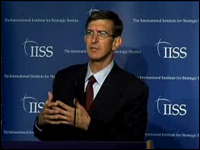Registration
You will receive an email confirming your registration.
The abolition of nuclear weapons is rising on the international agenda, made clear in statements by U.S. presidential candidates, British and Indian leaders, and a campaign led by former U.S. officials. At the same time, critical foreign policy challenges over Iran, North Korea, Syria, and the A.Q. Khan network heighten fears of proliferation, making nuclear disarmament seem quixotic to some observers.
In a new Adephi Paper published by the International Institute for Strategic Studies (IISS), George Perkovich and James M. Acton explore in unprecedented detail whether and how the elimination of all nuclear arsenals could be verified and enforced. George Perkovich was joined by Sir Michael Quinlan, a consulting fellow at IISS, in a discussion about the paper at Carnegie. They highlighted the following:
- The Notion of Abolition is Not New. Although it may take decades to get to zero nuclear weapons, the length and challenges of the road ahead should not cause the international community to "acquiesce passively to any notion that [nuclear weapons] have got to be around for the rest of human history." Each step towards disarmament is beneficial in its own right.
- Establishing Political Conditions to Enhance the Feasibility of Abolishing Nuclear Weapons. The project of elimination cannot be separated from global balance of power politics. The most important near-term requirement is for the United States, China, and Russia to agree on a strategic vision for the future.
- Verifying the Transition to Zero. While important, verification receives too much emphasis in current disarmament debates, perhaps because people are more comfortable looking for technical fixes than dealing with more determinative political challenges. States should recognize that a certain degree of uncertainty will exist regarding past stockpiles, and this uncertainty should not freeze movement towards abolition. Additionally, states need to mobilize social forms of monitoring, such as whistleblowing and corporate responsibility measures in creative and different ways.
- Managing the Nuclear Industry in a World without Nuclear Weapons. Dual-use technologies necessary for the development of nuclear energy create a circular "who goes first" problem with nuclear weapon states that argue for stronger nonproliferation rules, but are unwilling to disarm, and non-nuclear weapon states that refuse to tighten nonproliferation rules without a credible intent to disarm among nuclear-armed states. A solution must, therefore, provide for cooperative movement, with both sides compromising simultaneously. Stronger safeguards also need to be created and accepted by states. The nuclear industry needs to become a partner in global nonproliferation.
- Enforcement should receive the most attention from policy makers working to eliminate nuclear weapons since verification will never be 100% accurate. The UN Security Council would probably play a central role in enforcement, but means must be created to allow nuclear-armed states that are outside the Security Council, particularly India, to participate in enforcement decision-making processes.
During the question and answer session, participants challenged Perkovich on the concept of nuclear peace, the utility of prohibition before abolition, no-first-use agreements, and his views on Israel's undeclared nuclear capability, the U.S.-India 123 Agreement, and the deteriorating relationship between the United States and Russia.
Click here for further information on ordering copies of this paper.
